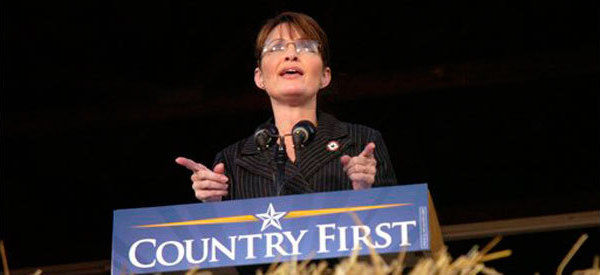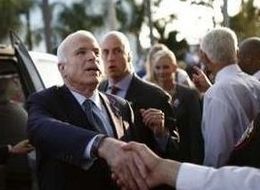PALIN A SERIOUS LIABILITY FOR MCCAIN

The Palin Plunge: Voters Sour On McCain VP Pick
 The more voters learn about Sarah Palin, the more wary they become. Once the focus of post-convention Republican euphoria, the Alaska Governor is now viewed as a serious liability to the McCain campaign.
The more voters learn about Sarah Palin, the more wary they become. Once the focus of post-convention Republican euphoria, the Alaska Governor is now viewed as a serious liability to the McCain campaign. As it stands, Palin's polling numbers are daunting: with the unfolding economic crisis, her favorable to unfavorable ratings have switched from a positive 40-30, according to a September 12-16 New York Times survey, to a negative 32-41 in an October 10-13 survey.
Palin is, additionally, costing McCain newspaper endorsements. Editor and Publisher calculated that as of Oct 18, Barack Obama led McCain 58-16 in the competition for the backing of newspapers. Many of the endorsements cited Palin as a factor in their rejection of McCain. The Salt Lake Tribune, which supported George W. Bush in 2004, commented that "out of nowhere, and without proper vetting, the impetuous McCain picked Alaska Gov. Sarah Palin as his running mate. She quickly proved grievously under-equipped to step into the presidency should McCain, at 72 and with a history of health problems, die in office. More than any single factor, McCain's bad judgment in choosing the inarticulate, insular and ethically challenged Palin disqualifies him for the presidency." The Kansas City Star, in turn, described Palin as "unqualified."
Brookings Senior Fellow Thomas Mann told the Huffington Post that initially, Palin both built conservative enthusiasm for McCain and drew widespread interest among voters who had not been closely following the race. But those benefits soon evanesced:
"Within weeks, she became a liability, primarily as a highly visible indicator of McCain's impulsiveness and recklessness in picking someone who is patently unqualified to serve as president and commander-in-chief. McCain's only chance of making this election competitive was to contrast his readiness to serve with Obama's inexperience and naiveté. The Palin choice was the first clear sign (others followed) that McCain could not win that comparison."
Norman Ornstein, of the American Enterprise Institute, agrees about the immediate gains, noting that the "short term boost dissipated awfully quickly. Palin's clear lack of capability to serve as VP, much less as president, her lack of knowledge of even basics about most areas of policy, her ethical problems in Alaska over Troopergate, and the campaign decision to cloister her from serious scrutiny, all caused a drop in her own approval, but also reflected on McCain's decision-making style." Palin continues to "generate enthusiasm from hard-core Republicans who would not be as charged-up if the running mate were, say, a [Mitt] Romney or [Tim] Pawlenty," Ornstein says, "but the downside is definitely greater than the gain."
Palin's analysis of the current economic crisis has not won over most voters seeking a serious appraisal of the situation accompanied by well-thought out proposals. In a highly sympathetic interview with Sean Hannity on Fox News, the verbatim exchange on the economy went as follows:
PALIN: "Certainly it is a mess though, the economy is a mess. And there have been abuses on Wall Street and that adversely affects Main Street.And it's that commitment that John McCain is articulating today, getting in there, reforming the way that Wall Street has been allowed to work, stopping the abuses and that violation of the public trust that too many CEOs and top management of some of these companies, that abuse there has got to stop.
It is, somebody was saying this morning, a toxic waste there on Wall Street, affecting Main Street. And we've got to cure this."
HANNITY: "Through reform?"
PALIN: "Through reform, absolutely. Look at the oversight that has been lax, I believe, here it's a 1930s type of regulatory regime overseeing some of these corporations. And we've got to get a more coordinated and a much more stringent oversight regime. Not that government is going to be solely looked to for the answers in all of the problems in Wall Street, but government can play a very, very appropriate role in the oversight as people are trusting these companies with their life savings, with their investments, with their insurance policies and construction bonds and everything else. When we see the collapse that we're seeing today, you know that something is broke and John McCain has a great plan to get in there and fix it."
HANNITY: "Is Senator Obama then using what happened on Wall Street this week? Is he using it for political gain? Is there a danger of a presidential candidate is saying to the world that America's situation of economic crisis is the worst that we've seen in decades -- which was words that he was using yesterday -- is there a danger in terms of the world hearing that?"
PALIN: "Well, there is a danger in allowing some obsessive partisanship to get into the issue that we're talking about today. And that's something that John McCain too, his track record, proving that he can work both sides of the aisle, he can surpass the partisanship that must surpassed to deal with an issue like this. It is that profound and that important an issue that we work together on this and not just let one party try to kind of grab it all or capture it all and pretend like they have all the answers. It's going to take everybody working together on this."
Vice presidential picks have been considered by political scientists as irrelevant to the outcome. This year, however, there is a contribution Palin may make: If McCain loses Florida by a close margin, Palin will likely deserve responsibility because of the animosity she has generated among a key constituency the GOP was depending on to abandon its traditional support for Democrats: older Jewish voters.
In Florida, where McCain had led - sometimes by relatively strong margins - Obama took the lead during the past month. Real Clear Politics gives Obama a 3.2 percentage point advantage in the state, which has become a key battleground.
In 2004, George W. Bush beat John Kerry 52-47 in Florida, while losing the Jewish vote, which makes up five percent of the electorate, 4-1.
On May 22, 2008, well before the Palin pick, the New York Times reported widespread concerns about the prospective Democratic nominee in a story headlined "As Obama Heads to Florida, Many of Its Jews Have Doubts."
The Palin pick was from the start viewed even more negatively by Jewish voters. By a margin of 57-37, Jewish voters nationwide said they disapproved McCain's decision according to a September 8- 21 survey by the American Jewish Committee.
Among Florida Jewish voters, according to University of Florida political scientist Ken Wald, "there's a great deal of resistance to her for a couple of reasons. First, on the issues, she's simply wrong. Jews as a group are pro-choice, anti-gun, and generally associated with liberal values on social and economic issues. Even many orthodox Jews, who are somewhat more traditionalist, are hardly raging social conservatives. The fact that her church hosted a Jews for Jesus speaker--at a service she attended and applauded--adds insult to injury. (Many in the Jewish community consider Jews for Jesus as a group that seeks the continuation of the Holocaust by peaceful means.)"
In addition, Wald told the Huffington Post, "among middle-class Jewish career women in particular, there's a resentment bordering on rage that somebody so obviously unqualified was appointed on the assumption that she would appeal to women. As women of accomplishment, they deeply resent the pandering and take it quite personally."
In an interview with the Tampa Bay Times and Bay News McCain acknowledged that he would be having a much easier time in Florida had he picked the state's Governor, Charlie Crist, instead of Palin. "Charlie, because he's so popular, he probably would have made a significant difference,'' McCain said, "Look, this is a tough decision that we made with Sarah Palin. But I also saw Sarah Palin come down here and energize crowds in a way that's pretty remarkable, too."
The crucial long-range question about Palin is whether she becomes the banner carrier for Republican conservatives, especially social conservatives, earning their support for the GOP nomination in 2012.
Conservative author and publicist Craig Shirley argues that Palin's "first job was to unify the convention and this she accomplished, even better than expected. Her second job was to rally the base and at this she has been less successful, though through little fault of her own. ... Her only weakness is that her handlers did not believe in Palin as much as she believed in herself and as a result, she has been damaged and thus has some rehabilitation work ahead of her."
Shirley holds in disdain those on the right who have criticized or turned against Palin: "The sunshine conservatives and summer Reaganites who have cut and run on Palin are the same weak-sister Republicans who chose Gerald Ford over 'that actor' Ronald Reagan in 1976, because he went to Eureka College and because he foolishly thought we could defeat Soviet Communism. Didn't he know all the sophisticates on both sides supported 'détente'?"
In the immediate aftermath of Palin's nomination over a month ago, Washingtonpost.com's Chris Cillizza noted the surge of enthusiasm for her: "While any number of candidates -- former Massachusetts Gov. Mitt Romney, former Arkansas Gov. Mike Huckabee, Florida Gov. Charlie Crist, Minnesota Gov. Tim Pawlenty -- are already being seriously mentioned, Palin has quickly eclipsed all of them when it comes to 2012 positioning. She is seen as the bright new star in the Republican universe and it seems unlikely that her fresh-faced appeal will wear off completely -- especially among the GOP rank and file voters who tend to decide the identity of their party's nominee."
That luster has, however, come off and -- despite Democrats privately cheering her on -- Palin's future as a national politician now appears likely to be damaged.
In what read more like an obituary than a commentary, Peggy Noonan wrote in the Wall Street Journal: "In the end the Palin candidacy is a symptom and expression of a new vulgarization in American politics. It's no good, not for conservatism and not for the country. And yes, it is a mark against John McCain, against his judgment and idealism."
Even at that price, many records won't be available until after the election

Sarah Palin's office has discovered a renewable resource to bring millions of dollars into Alaska's economy: the governor's e-mails.
The office of the Republican vice-presidential nominee has quoted prices as high as $15 million for copies of state e-mails requested by news organizations and citizens. No matter what the price, most of the e-mails of Palin, her senior staff and other state employees won't be made public until at least several weeks after the Nov. 4 presidential election, her office told msnbc.com on Thursday.
How did the cost reach $15 million? Let's look at a typical request. When the Associated Press asked for all state e-mails sent to the governor's husband, Todd Palin, her office said it would take up to six hours of a programmer's time to assemble the e-mail of just a single state employee, then another two hours for "security" checks, and finally five hours to search the e-mail for whatever word or topic the requestor is seeking. At $73.87 an hour, that's $960.31 for a single e-mail account. And there are 16,000 full-time state employees. The cost quoted to the AP: $15,364,960.
And that's not including the copying costs. Although the e-mails are stored electronically in Microsoft Outlook and on backup servers, and although a blank CD-ROM costs only 41 cents at Capital Office Supply in Juneau, the governor's office says it can provide copies only on paper.
Why? Because lawyers need printouts so they can black out, or "redact," private or exempted information. That task is more difficult because Palin and her senior staff have used government e-mail accounts for some personal correspondence, and personal e-mail accounts for much of their government correspondence. The photocopies of those printouts will be a relative bargain, only 10 cents a page. A state administrator said he understood that such redaction could be done electronically, but that state offices weren't set up to do that.
That process of deleting information is likely to be so lengthy that most requestors won't be able to see the records until well after the next president and vice president are chosen, Palin's office said.
E-mail sent between the governor's staff and their private Yahoo e-mail accounts won't be collected until Oct. 31. Searches will take an additional two weeks, until Nov. 14. And then the legal review of each e-mail will begin. There's no telling how long that will take, because no one knows how many e-mails there are, wrote Linda J. Perez, administrative director for the governor, in a letter she sent to the state attorney general seeking approval for a delay.A small victory: Copies of the requests themselves
Msnbc.com did receive from Palin's office copies of all the public records requests filed since she was inaugurated, and the replies from the governor's office. Palin took office in December 2006, after seeking office on a platform of clean and transparent government.
The price quotes reveal that Palin's office has repeatedly tried to charge different news organizations the cost to reconstruct the same e-mail accounts of the governor, her senior staff and other employees. Each time an e-mail is requested, the office quotes the same cost of $960.31 for 13 hours to recover and search each employee's e-mails.
NBC's price quote for e-mails sent to Todd Palin: $15 million.
The AP's price for e-mails between state employees and the campaign headquarters of Republican presidential nominee Sen. John McCain: $15 million.
And the AP again, for e-mails between state employees and the National Park Service (on polar bears, wolves and other topics): $15 million.
The AP's news editor in Anchorage, Mark Thiessen, told msnbc.com he wasn't authorized to say whether the AP, a nonprofit cooperative owned by newspapers, planned to pay the $45 million for e-mails.
You can read all the requests for records, and the responses of Gov. Palin's office in this PDF file.
The employees in the governor's office have been polite and responsive in fulfilling the request by msnbc.com for all the public records requests and replies. The charge was only $37.70 for photocopies, and the administrative coordinator, Michelle Fabrello, dashed out the door to make sure the package got in the overnight mail delivery.
No free passes
Palin's office hasn't always interpreted state law in favor of public access. The Alaska law on public records does not require it to charge any fee for public records, although a fee is allowed if the processing would take five hours or more. The state law says all fees may be waived if the information is used for a public purpose, such as journalism or academic research.
But the governor and the Law Department have been waiving fees only when they are just a few dollars. The state has not been granting requests to waive the fees in the public interest, because it has not been considering those requests.
The records released to msnbc.com show that the state is charging for e-mails at the same hourly rate that it charged before Palin was chosen by McCain on Aug. 29. Only the scale of the requests has changed, and now most requests come from out of state. (State law does not require requestors to be residents.) There are some in-state requests, including the local news organizations, the Democratic party and several citizens. The state employees union, which had filed an ethics complaint against Palin in the inquiry known as Troopergate, was told it would have to pay $88,000 to see e-mails for a list of employees in the governor's office.
Even before interest in Palin went national, large and small news organizations in Alaska have been dissuaded from seeking public records from her administration, because of the cost. Voice of the Times, a conservative online news site, was quoted a price of $1,250 in May to retrieve e-mails from the accounts of two top aides to the governor, Ivy Frye and Frank Bailey. "Please cancel my request for public records," editor Paul Jenkins wrote to the governor's administrator. "We have a limited budget here and paying $1,250 in fees for people who already are on the state payroll is ridiculous." The newspaper announced this week it will shut down at the end of October for lack of money.
A weekly paper, the Anchorage Press, was told it would have to pay $6,500 for e-mails of Palin and three aides relating to the lieutenant governor. The request was withdrawn, with the newspaper offering the apology. ""Hi Linda - wow, that's an expensive request I made," reporter Brendan Joel Kelley wrote to state administrator Linda Perez. "In that case, I definitely don't want to waste 60 hours of the state's resources, whether we had the fee waived or not. Consider the request withdrawn. I had supposed/hoped that an electronic records request would be fairly simple."
A similar situation was settled in Missouri this week. Gov. Matt Blunt agreed to turn over e-mails, at no cost, a year after three news organizations sued for the records. Blunt's office at first had quoted thousands of dollars in fees for the e-mails about his firing of a deputy general counsel. And in New Jersey earlier this year, a state judge ruled against Gov. Jon Corzine, who wanted to keep private his e-mails with a union leader, his ex-girlfriend. Blunt is a Republican, Corzine a Democrat.
State employees overwhelmed
Since Palin was chosen by McCain, state employees have been overwhelmed by hundreds of public records requests sent to the governor's office and other agencies, said Kevin Brooks, deputy commissioner of the state Department of Administration. There's been no attempt to delay release of public records about the governor until after the election, he said. Many records requests have been fulfilled, forming the basis of news stories and online archives such as the one growing at governmentattic.org.
But e-mails have been much slower to emerge through the tight window of nine weeks from Palin's selection until the election.
"I've had my information technology folks working nights and weekends. These people are not doing their regular jobs anymore," Brooks said. "We used to get several records requests for e-mail in a week, or a month. Now it's literally hundreds and hundreds. It's gone exponentially off the charts."
After msnbc.com challenged apparent double billing, Brooks said he was going to try a new approach: assembling the e-mail files a single time, without charging requestors for that time. But that still leaves the search and copying costs.
"Hindsight is 20-20," Brooks said. "If we could do it over again, we would have loaded it all up and done these requests." Still today, he said he was not considering taking a more active approach, posting online for the public all of the governor's e-mails.
Brooks said he was also rethinking that rate of $73.87 an hour. That cost is not the actual salary of any particular employee. At that rate, an employee would be making about $144,000 a year. Instead, the state has been charging the public and news organizations the same rate that the state Enterprise Technology Services group charges other state departments, as a cost-shifting mechanism on state budget forms.
Alaska law does allow the state to charge for an employee's time for recovery of records. Brooks said he thought the actual cost would be between $50 and $60 an hour, including benefits and a share of the department's overhead costs.
As for the estimate of up to five hours to search e-mail for a single word or phrase, Brooks said he was just passing along the estimate from the technical staff.
‘A heckuva lot’ of data
"Why five hours? I've asked repeatedly, and that's what they say it will take," Brooks said. "We're talking about 5 terabytes of compressed data. I don't know what a terabyte is. I just know it's a heckuva lot."
Brooks said the state has Outlook on the desktop computers of employees, and that a search of those e-mails would take only a few seconds. But he said most e-mails are on journal servers, which hold e-mail for many employees, and that older or deleted messages might be on archival servers. "The point is we have three sources. We pull from those three and download to a storage device we can search. The process is not simple."
The courts have given the Palin administration a nudge toward open records. A state judge ruled this week that the state must retrieve public e-mails sent between state accounts and the private e-mail accounts used by the governor and other state employees.
Having a private e-mail account, by itself, is not unusual or unethical, because state employees are forbidden to carry out political activities on government accounts. That's the reason given for Palin's habit of punching away on two separate Blackberry devices. But a citizen request earlier this year yielded hundreds of heavily redacted e-mails from the governor's office, which suggested that Palin and her staff had chosen to move most of their government conversations off the radar, to their Yahoo accounts. News reports then led to public curiosity and the hacking of one of Palin's Yahoo accounts, for which a college student in Tennessee, the son of a Democratic legislator, has been indicted.
Brooks said the state doesn't know yet how much e-mail it can recover from Yahoo, in cases where one state employee on a personal account e-mailed another on a personal account.
But the state probably can recover e-mails sent between government and personal e-mail accounts, he said. At least 18 public records requests have been filed for some or all of those e-mails. The requestors include Mother Jones magazine, the AP, NBC, the Anchorage Daily News, the Juneau Empire, msnbc.com, CNN, the Alaska Democratic Party, and several citizens, including Andree McLeod, whose request for the Yahoo e-mails was upheld by the court. Msnbc.com, for example, sought all e-mails sent or received by the governor and a dozen top aides between their state accounts and the personal e-mail accounts of themselves and others. The request included e-mail sent to Palin's husband, Todd, who has been active in policy and political discussions. The state quoted a price of $11,000 for all the e-mails sought by msnbc.com, which apparently won't be available until after the election.
To respond to those requests, the state is pulling together all the e-mails sent or received by 51 employees, including Palin, her senior staff, members of the Cabinet, the governor's assistants and schedulers, and key staff involved with the pipeline proposed to bring natural gas from Alaska's North Slope, the governor's office said Thursday. It sought the attorney general's approval to delay the search of the e-mails until mid-November. Later Thursday, the attorney general, Talis J. Colberg, sent the requestors a letter offering them a chance to be heard before he rules on that request.
'The hottest thing right now'
Many states have had battles with news organizations and citizens over the fees charged for access to the public's records, particularly for electronic records such as e-mails.
News organizations have often claimed that the fees are used as a tollbooth to discourage requests, and that requests are delayed until interest in a public issue or candidate has long passed.
Federal law is more favorable. The federal Freedom of Information Act will change in January to penalize agencies for delay. After January, if an agency takes more than 20 days to respond to a request, it can't charge any duplication fees to individual requestors.
Nationally, access to e-mails of government employees "is the hottest thing right now in open government," said Lucy Dalglish, executive director of the Reporters Committee for Freedom of the Press, a nonprofit that helps journalists obtain public records. "Most judges are interpreting the laws that if you use your private e-mail for state business, that's a public record.
"Many public officials thought e-mail was more like a phone call, but it's more like a letter. You type those words, those are like documents. It doesn't matter if you used a piece of paper from your home or stationery from your office. The form doesn't matter."










